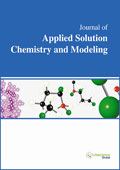jascm
|
|
Abstract: Benzotrifluoride (BTF), an eco-friendly solvent, can dissolve many organic and fluorous molecules because of the organic and fluorous motifs in its structure. Using BTF as solvent, we have developed a series of reactions for perfluoroalkylation of various unsaturated compounds upon photoirradiation with a Xe lamp through Pyrex. For example, alkynes, allenes, vinylcyclopropanes, isocyanides, diynes, dienes, and enynes successfully undergo regioselective perfluoroalkyliodination, perfluoroalkylselenation, and perfluoroalkyltelluration in BTF. In addition, the present photoinitiation procedure can be applied to trifluoromethylation. Keywords: Benzotrifluoride, Perfluoroalkylation, Organic/fluorous hybrid solvent, Radical addition reaction, Atom-economical reaction.Download Full Article |
|
|
Abstract: The proton-ligand dissociation constants of some azosulfoxine derivatives and metal-ligand stability constants of their complexes with the metal ions (Mn2+, Co2+, Ni2+ and Cu2+) have been determined potentiometrically in 0.1 MKCl and 50 % (by volume) DMF–water mixture at (298, 308 and 318) K. The stability constants of the formed complexes increases in the order Mn2+, Co2+, Ni2+ and Cu2+. The effect of temperature was studied and the corresponding thermodynamic parameters (∆G, ∆H and ∆S) were derived and discussed. The dissociation process is non-spontaneous, endothermic and entropically unfavourable. The formation of the metal complexes has been found to be spontaneous, endothermic and entropically favourable. Keywords: Azosulfoxines, potentiometry, stability constants and thermodynamics.Download Full Article |
|
|
Abstract: Ultrasonic and UV-spectral studies have been carried out for three ternary systems containing N-methylaniline (NMANI) and three structurally different aromatic aldehydes, benzaldehyde (BA), cinnamaldehyde (CA) and salicylaldehyde(SA) in n-hexane medium at 303.15 K and at atmospheric pressure. Acoustical parameters are computed from the measured values of ultrasonic velocity, density and dynamic viscosity. The variation of acoustical parameters in the concentration range investigated establishes complex formation through intermolecular hydrogen bonding between aldehyde and N-methylaniline. The existence of strong aldehyde-amine interaction is also confirmed through the recorded UV-Visible absorption spectra with Benesi-Hildebrand theory at 303.15 K. The formation constants of the hydrogen bonded complexes are determined by spectroscopic and ultrasonic methods and compared. These values computed by two different methods are comparable and follow similar trend. The trend in the formation constants is discussed based on structures of the component molecules and correlate with computed molecular properties. Keywords: Aldehyde-amine H-bonded complex, stability constants, structural effect.Download Full Article |



